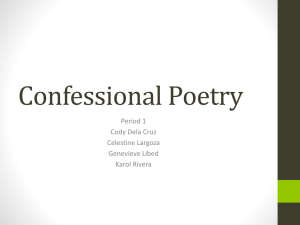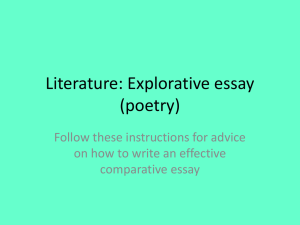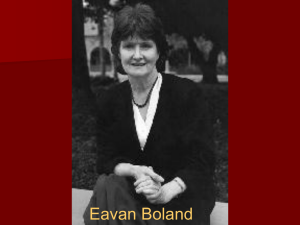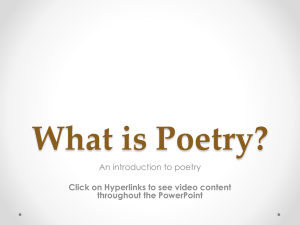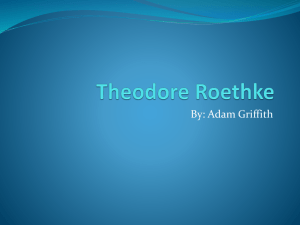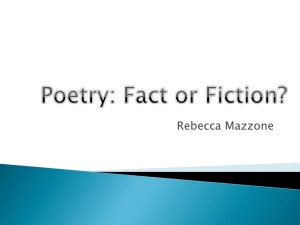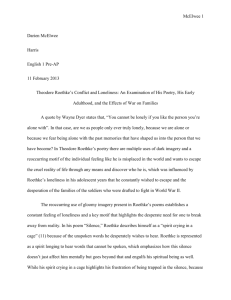View Sample Syllabus - Longwood University
advertisement
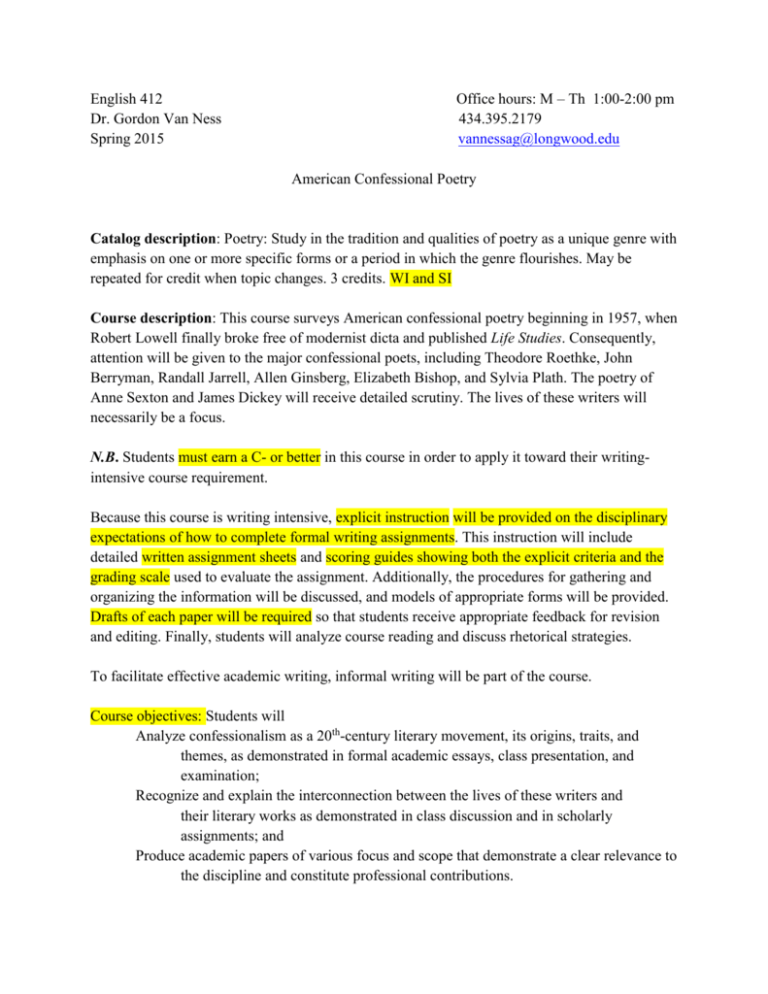
English 412 Dr. Gordon Van Ness Spring 2015 Office hours: M – Th 1:00-2:00 pm 434.395.2179 vannessag@longwood.edu American Confessional Poetry Catalog description: Poetry: Study in the tradition and qualities of poetry as a unique genre with emphasis on one or more specific forms or a period in which the genre flourishes. May be repeated for credit when topic changes. 3 credits. WI and SI Course description: This course surveys American confessional poetry beginning in 1957, when Robert Lowell finally broke free of modernist dicta and published Life Studies. Consequently, attention will be given to the major confessional poets, including Theodore Roethke, John Berryman, Randall Jarrell, Allen Ginsberg, Elizabeth Bishop, and Sylvia Plath. The poetry of Anne Sexton and James Dickey will receive detailed scrutiny. The lives of these writers will necessarily be a focus. N.B. Students must earn a C- or better in this course in order to apply it toward their writingintensive course requirement. Because this course is writing intensive, explicit instruction will be provided on the disciplinary expectations of how to complete formal writing assignments. This instruction will include detailed written assignment sheets and scoring guides showing both the explicit criteria and the grading scale used to evaluate the assignment. Additionally, the procedures for gathering and organizing the information will be discussed, and models of appropriate forms will be provided. Drafts of each paper will be required so that students receive appropriate feedback for revision and editing. Finally, students will analyze course reading and discuss rhetorical strategies. To facilitate effective academic writing, informal writing will be part of the course. Course objectives: Students will Analyze confessionalism as a 20th-century literary movement, its origins, traits, and themes, as demonstrated in formal academic essays, class presentation, and examination; Recognize and explain the interconnection between the lives of these writers and their literary works as demonstrated in class discussion and in scholarly assignments; and Produce academic papers of various focus and scope that demonstrate a clear relevance to the discipline and constitute professional contributions. Required texts: Dickey, James. The Whole Motion: Poems, 1945-1992. Hanover and London: Wesleyan U P, 1992. Print. ---. Self-Interviews. New York: Doubleday, 1970. Print. Middlebrook, Diane Wood. Anne Sexton: A Biography. Boston: Houghton Mifflin, 1991. Print. Ramazani, Jahan, Richard Ellmann, and Robert O’Clair, eds. The Norton Anthology of Modern and Contemporary Poetry. Vol. 2. New York: Norton, 2003. Print. Rosenthal, M.L. The New Poets: American and British Poetry Since World War II. New York: Oxford U P, 1967. Print. Sexton, Anne. The Complete Poems. Boston: Houghton Mifflin, 1981. Print. Recommended texts: Berryman Halliday, E.M. John Berryman and the Thirties: A Memoir Mariani, Paul. Dream Song: The Life of John Berryman Bishop Goldensohn, Lorrie. Elizabeth Bishop: The Biography of a Poetry Dickey Hart, Henry. James Dickey: The World as a Lie Ginsberg Merrill, James. Allen Ginsberg Jarrell Jarrell, Mary von Schrader. Remembering Randall: A Memoir of Poet, Critic, and Teacher Pritchard, William H. Randall Jarrell: A Literary Life Lowell Hamilton, Ian. Robert Lowell: A Biography Mariani, Paul. Lost Puritan: A Life of Robert Lowell Plath Wagner-Martin, Linda. Sylvia Plath: A Literary Life Roethke Seeger, Allan. The Glass House: The Life of Theodore Roethke Sexton Hall, Caroline Kay Bernard. Anne Sexton Recommended texts (con’t): Breslin, James. From Modern to Contemporary: American Poetry, 1945-1965 Ferguson, Suzanne. Jarrell, Bishop, Lowell, & Co. Simpson, Eileen. Poets in Their Youth: A Memoir Class schedule: January 14 16 --19 21 23 --26 28 February 30 --2 4 6 --9 11 13 --16 18 March 20 --23 25 27 --2–6 --- Introduction to the course Lecture on confessionalism: Rosenthal, Chapter 1 No classes Lecture (con’t): Chapters 2, 3; Writing in the discipline: Dave Smith’s “The Big Wink,” a review of Robert Kirschten’s James Dickey and the Gentle Ecstasy of Earth: A Reading of the Poems Robert Lowell: A Biographical Overview Lowell: “The Quaker Graveyard in Nantucket” Lowell: “After the Surprising Conversions” and “Memories of West Street and Lepke” Lowell: “Skunk Hour”; Roethke: (handouts) Paper I Draft Roethke: (handouts); Writing in the discipline: John Boyd’s “Texture and Form in Theodore Roethke’s Greenhouse Poems” Roethke: (handouts) Jarrell: “90 North,” “The Death of the Ball Turret Gunner,” and “Eight Air Force” PAPER I DUE Jarrell: “Next Day” and “Thinking of the Lost World” Bishop: “The Fish,” “At the Fishhouses,” and “Over 2000 Illustrations and a Complete Concordance” Bishop: “The Armadillo,” “In the Waiting Room,” and “One Art” Dickey: A Biographical Overview Dickey: Into the Stone; Writing in the discipline: H.L. Weatherby’s “The Way of Exchange in James Dickey’s Poetry” Dickey: Drowning with Others Dickey: Helmets Paper II Draft Dickey: Buckdancer’s Choice Dickey: Falling, May Day Sermon, and Other Poems Spring Break 9 11 13 --16 18 20 --23 April 25 27 --30 1 3 --6 8 10 --13 15 17 --20 22 24 Dickey: The Eye-Beaters, Blood, Victory, Madness, Buckhead and Mercy Dickey: The Zodiac PAPER II DUE Sexton: A Biographical Overview Sexton: To Bedlam and Part Way Back Sexton: All My Pretty Ones Sexton: Live or Die Sexton: Love Poems; Writing in the discipline: William Shurr’s “Anne Sexton’s Love Poems: The Genre and the Differences” Sexton: Transformations Sexton: The Death Notebooks Paper III Draft Sexton: The Awful Rowing toward God Plath: “The Disquieting Muses,” “Metaphors,” “The Colossus,” and Morning Song” Plath: “In Plaster,” “Daddy,” “”Ariel,” “Lady Lazarus,” and “Edge” Presentations Presentations Presentations Presentations Presentations Berryman: Selections from The Dream Songs Berryman: Selections from The Dream Songs Ginsberg: “Howl” Ginsberg: “A Supermarket in California,” “Sunflower Sutra,” and “America” PAPER III DUE --Course grade Paper I Paper II Paper III Presentations Final examination 20% 20% 20% 20% 20% (500-1,000 words) (1,000-1,500 words) (1,500 -2,000 words) Essay-review Critical overview In-depth analysis Papers Three academic essays are required. The first, due February 6, is a book review of M.L. Rosenthal’s The New Poets: American and British Poetry Since World War II. Students will choose an appropriate venue for such a review, research the requisite length and style, and then write the review accordingly. The second essay, due March 11, analyzes several poems either by Randall Jarrell or Elizabeth Bishop, seeking to provide a larger understanding of the themes inherent in their works and what the poet was endeavoring to do, either consciously or unconsciously. The final paper is due April 24 and will center exclusively on the poems of either Dickey or Sexton. The second and third papers require a minimum of five secondary or critical sources. Only academic web sites are allowed. Manuscript requirements All written assignments must be typed and double-spaced with 12-point New Roman font and with margins of one inch on the sides and one-and-a-half inches on top. All essays must be paginated. When necessary, assignments must include appropriate MLA documentation and a Works Cited page. Staple or paperclip all essays, which are due at the beginning of the class period. All assignments must have the Longwood Honor Pledge correctly written out in full and signed. Failure to do so will result in the assignment being graded down by one-half letter. Presentations Additionally, students will formally present their third paper to the class and department faculty followed by a question-and-answer period in which students will be expected to show a larger understanding of academic material. Final examination The final exam will be a series of cumulative essays that must reveal student comprehension of the origins, traits, and themes of confessionalism as well as a clear recognition of this movement in the development of 20th-century American poetry. Attendance policy: Class attendance is vital to the learning process. It is impossible to glean the maximum benefit from this class when frequently absent. University policy mandates that a student attend at least 75% of her or his classes to pass a course. Therefore ten (10) is the maximum number of absences allowed in a MWF course. Four (4) absences are allowed without penalty; five result in automatic reduction of one letter grade for the course. Unreasonable tardiness (more than five minutes) will count as an absence. Honor Code: Papers suspected of plagiarism will automatically be turned over to the Honor Board for disciplinary action, including suspension or expulsion from Longwood.

